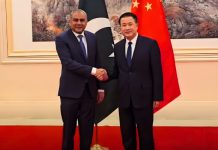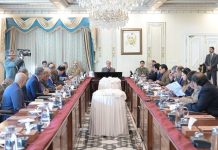During a joint news conference, Law Minister Farogh Naseem and British Home Secretary Sajid Javid announced that the ‘UK-Pakistan Justice and Accountability Partnership’ would work towards repatriation of illicit finances, recovery of stolen assets and putting a check on money laundering.
The British home secretary said his country would ensure that no person could escape accountability, clarifying that the initiative would be broad-based and was not mean to target individual cases only.
Javid said the new partnership would be headed by a special envoy to expand cooperation between the two sides in curbing corruption. The Director of Economic Crime Unit would be representing the British side, he added.
 The British Home Secretary, who is the first from his government to visit Pakistan after Prime Minister Imran Khan assumed the office, said the UK was committed to strengthen ties with the new government and reaffirm their partnership.
The British Home Secretary, who is the first from his government to visit Pakistan after Prime Minister Imran Khan assumed the office, said the UK was committed to strengthen ties with the new government and reaffirm their partnership.To a question, the Home Secretary rejected the impression that the UK was reluctant on issues of extradition-related matters with Pakistan and said he was mindful of respecting the domain of British law enforcement agencies. However, he stressed those responsible would be brought to justice whenever there was some evidence.
Asked about the quantum of money laundering, the British Secretary said both the sides reviewed their commitments on sharing evidence to prosecute the criminals.
As regards to the Financial Action Task Force (FATF), Sajid Javid said Pakistan was already working on the matter and the UK would extend all support to it in that regard. He said his country would deepen cooperation with Pakistan to counter illicit finances and corruption.
About the role and sacrifices of Pakistan against counter-terrorism, he said Pakistan had suffered more than any other country on that count.
He said Pakistan and the United Kingdom had deep ties in many areas. Some 120 British companies were already working here. Being a major trading partner, the UK would like its more companies to enter Pakistan as it was preparing to leave the European Union, he added.
Law Minister Farogh Naseem said both the sides also deliberated on the formation of a joint fund on the civil recovery of stolen assets, and appointment of a prosecution service at the British High Commission.
He said it was also agreed upon to ensure capacity-building of Pakistani law enforcement officials with the assistance of the United Kingdom.
Javid said he also spoke on an exchange of prisoners between Pakistan and UK during his meetings with authorities.
The British home secretary added that in his meeting with Prime Minister Imran Khan, the issue of money laundering was discussed.
During the news conference, the speakers were asked why the UK government did not hand over former prime minister Nawaz Sharif’s sons Hassan and Hussain and former finance minister Ishaq Dar to Pakistan despite their red warrants being issued. To this, Minister for Law and Justice Farogh Naseem said they did not discuss matters pertaining to any specific individual.
While responding to a question regarding Dar’s repatriation, Naseem said the agreement has a vast scope and is not drafted for a single person.
He added that the agreement would help in bringing back the money that was embezzled in Pakistan and transferred to foreign bank accounts.
British home secretary meets Pakistani FM
Earlier in the day, the British home secretary also met Foreign Minister Shah Mahmood Qureshi, during which the two sides discussed various areas of regional and bilateral cooperation particularly regional security, counter-terrorism, organised crime, migration, human trafficking, money laundering, and asset recovery.
Qureshi emphasised the need to translate existing ties into a tangible and multi-faceted strategic partnership.
He appreciated the UK Department for International Development’s contribution towards the development of socio-economic sectors in Pakistan.
The British home secretary conveyed his government’s desire to support and work closely with the new government in all areas of mutual interest.
The two countries closely cooperate under the institutional framework of the Enhanced Strategic Dialogue.



